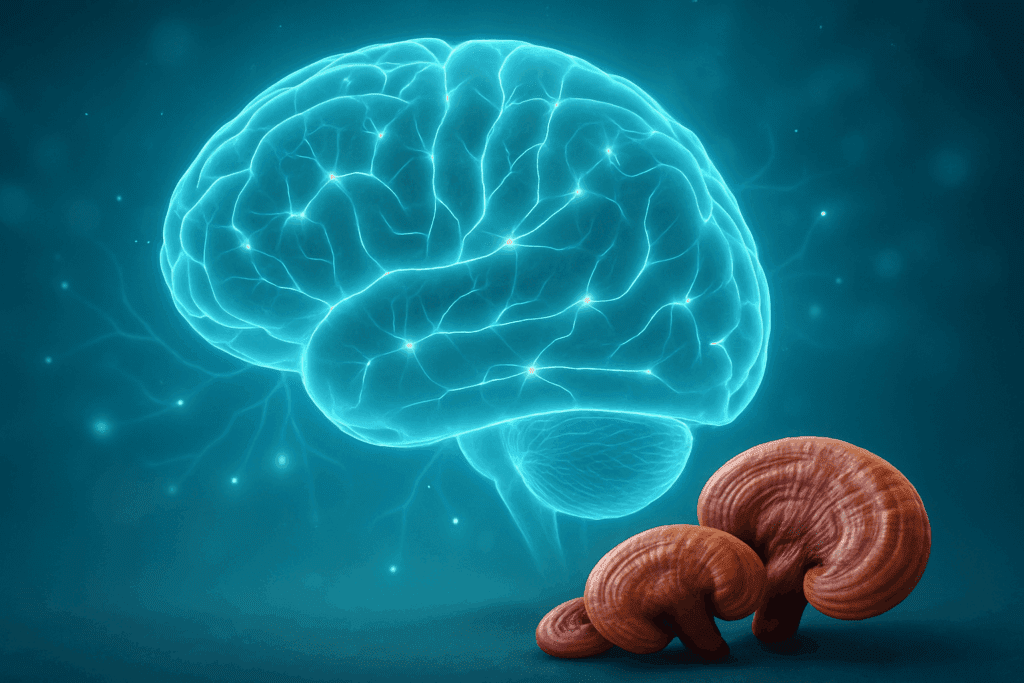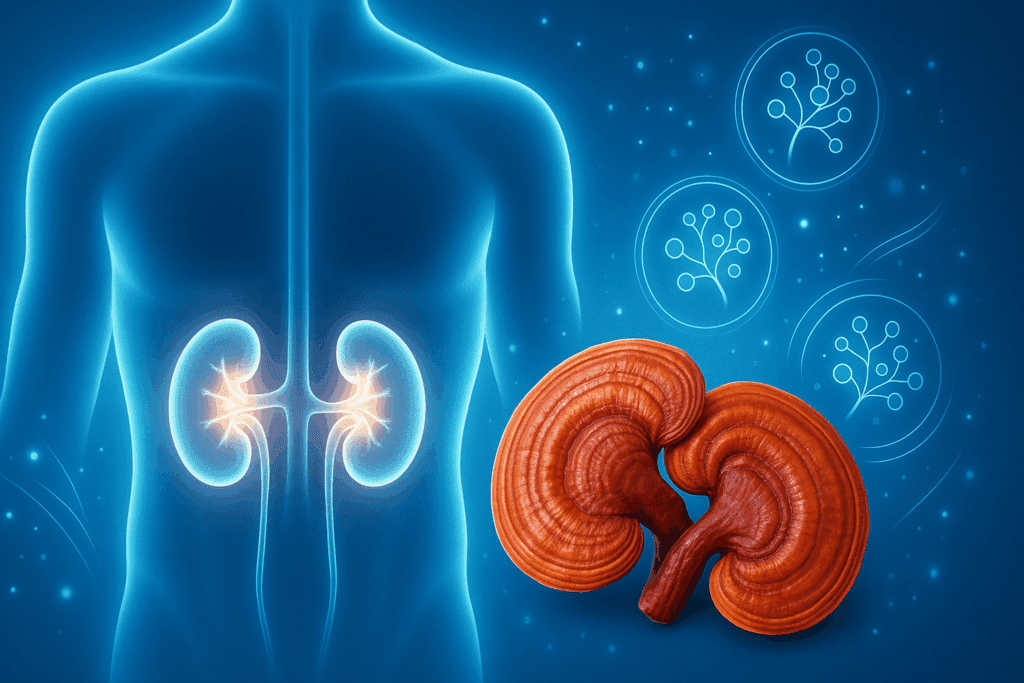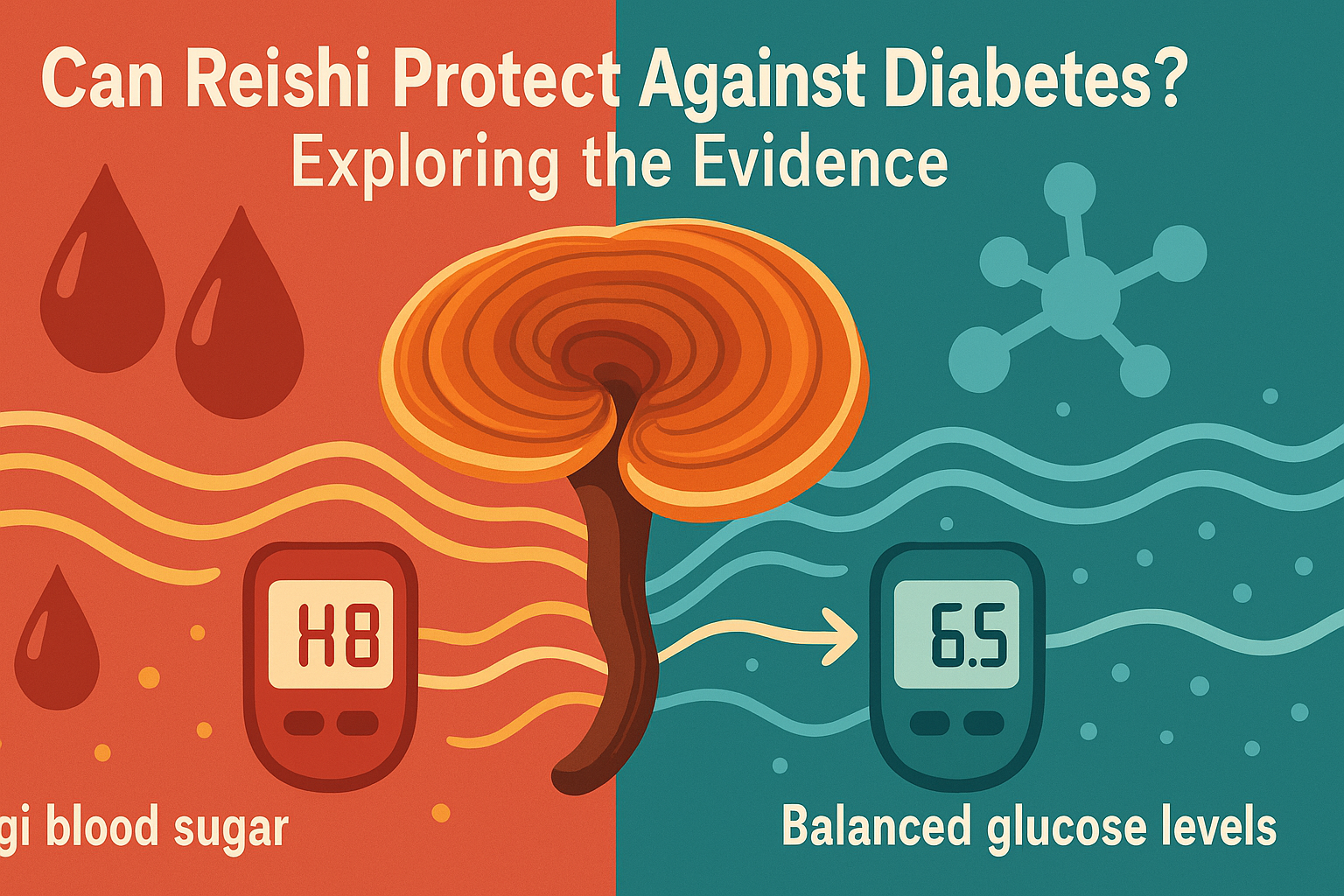Reishi mushroom, known scientifically as Ganoderma lucidum, has been revered for thousands of years in traditional Eastern medicine. Sometimes referred to as the “mushroom of immortality,” this remarkable fungus has been the subject of growing scientific interest due to its diverse therapeutic potential. But what is reishi mushroom good for exactly? Beyond its ancient reputation, modern research provides compelling insights into the health benefits associated with reishi mushroom powder, organic reishi mushroom products, and red reishi mushroom powder. As consumers increasingly seek natural ways to enhance wellness, reishi stands out as a versatile ally for brain health, immune support, and even skin vitality.
You may also like: How Lion’s Mane Supplements May Support ADHD and Cognitive Clarity: What Science Says About Lions Mane for Focus and Brain Health
Understanding Reishi: What Is Ganoderma and Its Historical Significance
The term Ganoderma encompasses a variety of mushroom species, but Ganoderma lucidum, commonly known as reishi, holds a particularly special place in herbal medicine. Historically, reishi was so prized in China and Japan that it was reserved for emperors and nobility. Ancient texts praised its ability to promote longevity, enhance vitality, and restore balance within the body. Today, while scientific scrutiny replaces mythological reverence, the essential question remains: what is reishi? It is a polypore mushroom characterized by a shiny, red-brown cap and a bitter taste, traditionally consumed as a tea or tincture but now widely available in reishi mushroom pills, lingzhi mushroom powder, and various other supplement forms.

Reishi Mushroom Benefits for Brain Health
One of the most exciting areas of research concerns reishi mushroom benefits for cognitive function. Emerging evidence suggests that reishi may offer neuroprotective effects, possibly reducing the risk of age-related cognitive decline. What does reishi mushroom do for the brain? Reishi compounds like triterpenes and polysaccharides are thought to support neuronal health by combating oxidative stress and inflammation—two major factors implicated in neurodegeneration. Additionally, there is growing curiosity about the use of reishi mushroom for anxiety. Some studies indicate that reishi may help modulate stress responses by supporting adrenal function and influencing neurotransmitter activity, providing a calming effect that enhances mental clarity without sedation.
Reishi Mushroom and Immune System Support
A cornerstone of reishi mushroom benefits lies in its profound impact on immune function. Research suggests that reishi compounds can enhance the activity of natural killer cells, macrophages, and other key components of the immune system. But what does reishi do specifically for immunity? It appears to balance immune responses, stimulating activity when needed to fight pathogens while reducing excessive inflammation that can damage tissues. This dual modulatory effect makes reishi particularly valuable as a daily mushroom root supplement. In addition, organic reishi mushroom products are often recommended to individuals seeking a holistic approach to immune resilience, especially during periods of high stress or seasonal vulnerability.
What Is Reishi Mushroom Good For Beyond the Brain and Immunity? Skin Support and Anti-Aging Potential
While reishi is often celebrated for its internal benefits, it also shows promise for skin health. Reishi skin benefits include antioxidant protection, anti-inflammatory effects, and improved hydration. Topical and oral use of reishi mushroom powder has been associated with enhanced skin elasticity and reduced signs of aging such as fine lines and hyperpigmentation. The polysaccharides in reishi are believed to stimulate natural hyaluronic acid production, which is crucial for maintaining skin moisture and suppleness. Additionally, reishi’s ability to support liver health indirectly benefits the skin, as the liver plays a vital role in detoxification and overall complexion health.

How to Use Reishi Powder and Other Supplement Forms
Given the diverse range of reishi products available, understanding how to use reishi powder effectively is essential. Reishi mushroom powder can be mixed into smoothies, teas, or coffee substitutes to create a nourishing daily ritual. For those seeking convenience, reishi mushroom pills provide standardized doses without the bitter taste traditionally associated with reishi extracts. When choosing products, it is advisable to select organic reishi mushroom supplements that guarantee purity and potency. It is also important to consider dosage: how much reishi per day is appropriate depends on individual goals and health status, but typical doses range from 1.5 to 9 grams of dried mushroom equivalent, depending on whether the product is a hot-water extract or another standardized form.
Is Reishi Mushroom Safe? Addressing Common Concerns
A common question among new users is, “Is reishi mushroom safe?” When consumed responsibly and within recommended dosages, reishi appears safe for most people. However, some individuals may experience mild digestive upset, dry mouth, or dizziness, particularly with high doses. Questions such as “Is reishi safe during pregnancy?” and “Is reishi mushroom safe while breastfeeding?” require careful consideration. There is limited research on reishi mushroom in pregnancy and reishi mushroom breastfeeding contexts, so it is best for pregnant and nursing individuals to consult with healthcare providers before starting supplementation. Likewise, individuals on blood-thinning medications or immunosuppressants should exercise caution, as reishi may interact with these therapies.
Reishi Mushroom Supplement and Creatinine Levels: What You Should Know
Another emerging area of interest is the potential relationship between reishi mushroom supplement and creatinine levels. Creatinine is a waste product filtered by the kidneys, and elevated levels can signal kidney dysfunction. Preliminary studies suggest that reishi may support kidney health by reducing inflammation and oxidative stress, yet definitive human studies are limited. Those with pre-existing kidney conditions should monitor their creatinine levels closely and consult healthcare professionals when considering the addition of reishi to their regimen. The complex interplay between natural supplements and organ function underscores the importance of personalized, medically supervised supplementation.
Mushroom Root Supplement and the Liver: How Reishi May Support Detoxification
Liver health is another critical domain where reishi shines. As a mushroom root supplement rich in bioactive compounds, reishi appears to offer hepatoprotective properties—meaning it helps protect liver cells from damage. Traditional practices and modern studies alike highlight reishi’s role in enhancing the liver’s detoxification pathways, supporting healthy bile production, and mitigating fibrosis. Given the liver’s central role in metabolizing toxins and hormones, maintaining its health with aids such as lingzhi mushroom powder can have wide-reaching benefits for energy levels, skin clarity, and overall vitality.

Can Reishi Protect Against Diabetes? Exploring the Evidence
With diabetes rates continuing to climb worldwide, natural interventions like reishi are gaining attention. So, can reishi protect against diabetes? Some animal and preliminary human studies suggest that reishi supplementation may help regulate blood sugar levels by improving insulin sensitivity and reducing oxidative stress. Specific polysaccharides found in reishi appear to modulate glucose metabolism, although large-scale clinical trials are needed to confirm these effects. Still, incorporating reishi mushroom powder into a holistic wellness plan may offer supportive benefits for those managing prediabetes or metabolic syndrome, especially when paired with diet, exercise, and medical supervision.
Does Eastern Medicine Use Reishi Mushrooms, and Is Reishi Mushroom Used in Medicine Today?
Historically, Eastern medicine has deeply revered reishi mushrooms. From traditional Chinese medicine (TCM) to Japanese Kampo medicine, reishi has been used to tonify the qi (vital energy), calm the mind, and bolster immune defenses. Even today, practitioners of integrative and functional medicine often recommend reishi supplements to complement conventional treatments. While the question “Is reishi mushroom a drug?” may arise, it is important to distinguish that reishi is classified as a dietary supplement in most countries, not a pharmaceutical drug. However, its pharmacologically active constituents make it a powerful adjunct to health protocols when used thoughtfully and responsibly.
Exploring Different Forms: Red Reishi Mushroom Powder and Lingzhi Mushroom Powder
Among the many variations of reishi available, red reishi mushroom powder is particularly esteemed. Red reishi contains higher concentrations of certain triterpenes and polysaccharides compared to other varieties, making it especially potent for therapeutic purposes. Lingzhi mushroom powder, a term often used interchangeably with reishi in Asian countries, typically refers to similar extracts standardized for maximum bioactivity. Choosing a high-quality, organic reishi mushroom product ensures that consumers reap the full spectrum of potential benefits without contaminants or inferior extraction methods.
Reishi Mushroom for Anxiety: Calming the Mind Naturally
The use of reishi mushroom for anxiety is gaining traction among natural health enthusiasts. As a recognized adaptogen, reishi helps the body adapt to stressors by regulating cortisol levels and supporting adrenal balance. Unlike pharmaceutical anxiolytics, reishi does not cause dependency or sedation, making it a compelling option for individuals seeking sustainable stress management. The phrase “reishi and anxiety” often surfaces in discussions about holistic mental health strategies, highlighting reishi’s ability to foster emotional resilience, better sleep quality, and enhanced cognitive function.
Practical Tips for Incorporating Reishi Mushroom into Your Daily Routine
Knowing how to use reishi mushroom effectively can greatly influence outcomes. Whether opting for teas, reishi mushroom pills, or red reishi mushroom powder smoothies, consistency is key. Many users find it helpful to incorporate reishi into a morning or evening ritual, aligning supplementation with periods of rest and rejuvenation. As always, sourcing matters: prioritize products that emphasize organic cultivation, dual extraction methods, and transparency in labeling. Gradually increasing dosage can help minimize digestive discomfort, and tracking subjective well-being over time provides valuable feedback for tailoring intake.

Frequently Asked Questions About Reishi Mushroom Benefits
What are the differences between red reishi mushroom powder and lingzhi mushroom powder?
Although the terms red reishi mushroom powder and lingzhi mushroom powder are often used interchangeably, there are subtle differences worth noting. Red reishi refers specifically to the reddish variant of Ganoderma lucidum, known for its particularly high concentration of triterpenoids and polysaccharides. Lingzhi, a broader term in Chinese, can refer to multiple varieties, including purple and black species, though red is the most common. Choosing between red reishi mushroom powder and lingzhi mushroom powder often depends on the concentration of active ingredients, intended therapeutic use, and sourcing practices. Many health enthusiasts favor organic reishi mushroom options that specify the strain and extraction method to ensure consistency and potency.
How can reishi mushroom powder support athletes and high-performance individuals?
Athletes and those in demanding physical professions may benefit uniquely from reishi mushroom powder due to its adaptogenic properties. Reishi mushroom benefits for endurance include improved oxygen utilization and enhanced recovery rates after intense exercise. Regular use of reishi mushroom pills or powders may help regulate cortisol, minimizing muscle catabolism under stress. Additionally, the anti-inflammatory effects of reishi benefits may contribute to reduced joint discomfort, aiding in sustained performance and longevity. For individuals seeking peak mental and physical condition, understanding what reishi mushroom is good for can open doors to smarter, more holistic recovery strategies.
Is reishi mushroom safe for long-term use?
One frequently asked question is whether reishi mushroom is safe for continuous use. Research and traditional practices suggest that moderate consumption of organic reishi mushroom products over extended periods is generally well-tolerated. However, individuals with autoimmune conditions should consult healthcare providers, as the immune-modulating effects could theoretically exacerbate such diseases. When used responsibly, reishi mushroom benefits may accumulate over time, contributing to enhanced resilience and vitality. Ensuring high-quality sourcing and understanding how much reishi per day suits your body’s needs are key aspects of safe long-term supplementation.
What are some lesser-known skin benefits of using reishi powder or supplements?
Beyond basic reishi skin benefits like hydration and anti-aging, there are emerging insights into its potential role in managing skin conditions exacerbated by stress. Chronic stress can manifest in flare-ups of acne, eczema, and psoriasis; using reishi mushroom for anxiety simultaneously supports calmer, healthier skin. Additionally, the antioxidant compounds in reishi mushroom powder may help protect the skin from environmental pollutants and UV radiation. Some integrative dermatologists now explore topical formulations containing lingzhi mushroom powder to address skin barrier repair. For those curious about what reishi is good for, its contributions to both internal balance and external radiance are becoming increasingly recognized.
Can reishi protect against diabetes, and how strong is the evidence?
Interest in whether reishi can protect against diabetes has sparked numerous preliminary studies. Some findings suggest that bioactive compounds in reishi mushroom powder can improve insulin sensitivity and support pancreatic health. Moreover, consistent supplementation with mushroom root supplement and the liver benefits associated with glucose metabolism may indirectly support blood sugar balance. Although clinical trials in humans remain limited, early results are promising enough that holistic practitioners sometimes recommend organic reishi mushroom as part of an integrative diabetes prevention strategy. As more robust trials emerge, reishi’s role in metabolic health will likely become more clearly defined.
How does reishi mushroom supplement and creatinine levels relate to kidney health?
Questions around reishi mushroom supplement and creatinine levels stem from concern about kidney function and overall metabolic waste clearance. Some animal studies propose that reishi benefits the kidneys by reducing oxidative stress and promoting healthy filtration processes. Nevertheless, individuals with existing kidney impairment should proceed cautiously and consult with medical professionals before using reishi mushroom pills or powders. Monitoring creatinine levels before and during supplementation ensures that any impact can be addressed early. Understanding what does reishi mushroom do for organ health expands its appeal beyond immunity and stress management to broader systemic support.
How should beginners approach learning how to use reishi powder effectively?
For newcomers, knowing how to use reishi powder starts with choosing a form that aligns with lifestyle and health goals. Some prefer the convenience of reishi mushroom pills, while others enjoy incorporating red reishi mushroom powder into teas or smoothies. Starting with a low dose and gradually increasing it allows the body to adjust without overwhelming the system. Moreover, sourcing organic reishi mushroom ensures that you receive the full spectrum of therapeutic compounds without unwanted additives. Personalizing intake schedules—such as using reishi at night to support sleep—can maximize the wide-ranging reishi mushroom benefits available to users.
Does Eastern medicine use reishi mushrooms differently than Western supplements?
When exploring the question, “Does Eastern medicine use reishi mushrooms?”, it is essential to recognize the context of treatment philosophy. In traditional Chinese medicine (TCM), reishi is not simply taken for symptomatic relief; it is prescribed to rebalance the body’s qi and address root causes of disease. Often combined with other herbs, reishi’s role in Eastern therapeutics is more integrative and personalized. In contrast, Western approaches often focus narrowly on isolated reishi benefits like immunity or anxiety reduction. Understanding the broader therapeutic intentions of what is reishi good for in different cultural contexts enriches one’s appreciation for this versatile mushroom.
Is reishi mushroom safe for pregnant and breastfeeding individuals?
While reishi mushroom benefits appeal to many wellness seekers, caution is advised when it comes to reishi mushroom in pregnancy and reishi mushroom breastfeeding. Limited human studies make it difficult to conclusively determine safety for these populations. Some practitioners suggest that reishi’s immune-modulating effects could be beneficial postpartum, particularly for restoring vitality. However, because hormonal and immune dynamics are highly sensitive during pregnancy and lactation, professional guidance is essential. Choosing gentle, organic reishi mushroom forms and starting with minimal doses under supervision can help minimize any potential risks.
Could reishi mushroom be classified as a drug in the future?
The question “Is reishi mushroom a drug?” touches on evolving regulatory landscapes. Currently, reishi is classified as a dietary supplement in most jurisdictions, but ongoing research into what does reishi do—especially its effects on immune modulation and metabolic health—may prompt reevaluation. Should potent standardized extracts be developed, it is plausible that specific formulations could be approved as botanical drugs. Until then, users must recognize that reishi mushroom benefits, though powerful, are not intended to replace conventional medical treatments. Staying informed about emerging research ensures responsible and effective use of reishi supplements.

Conclusion: Unlocking the Transformative Potential of Reishi Mushroom for Mind, Body, and Skin
Reishi mushroom stands as a timeless testament to the power of nature to support holistic health. From its remarkable reishi mushroom benefits for brain health and emotional resilience to its profound impact on immune vitality and skin rejuvenation, reishi continues to captivate both ancient wisdom seekers and modern scientists alike. Understanding what is reishi mushroom good for requires a nuanced appreciation of its multifaceted properties, from balancing stress responses to aiding in liver detoxification and potentially supporting metabolic health. As research progresses, the true scope of reishi’s healing potential becomes even more compelling. Whether you are exploring reishi mushroom for anxiety, considering its role in managing creatinine levels, or curious about reishi skin benefits, this extraordinary fungus offers a bridge between ancient tradition and cutting-edge wellness. As always, consult with healthcare providers when adding new supplements to your regimen, but for many, incorporating organic reishi mushroom into a balanced lifestyle can be a transformative journey toward optimal well-being.
Was this article helpful? Don’t let it stop with you. Share it right now with someone who needs to see it—whether it’s a friend, a colleague, or your whole network. And if staying ahead on this topic matters to you, subscribe to this publication for the most up-to-date information. You’ll get the latest insights delivered straight to you—no searching, no missing out.
Further Reading:
6 Benefits of Reishi Mushroom (Plus Side Effects and Dosage)
Everything you need to know about reishi mushrooms
Reishi Mushroom – Uses, Side Effects, and More
.Important Note: The information contained in this article is for general informational purposes only, and should not be construed as health or medical advice, nor is it intended to diagnose, prevent, treat, or cure any disease or health condition. Before embarking on any diet, fitness regimen, or program of nutritional supplementation, it is advisable to consult your healthcare professional in order to determine its safety and probable efficacy in terms of your individual state of health.
Regarding Nutritional Supplements Or Other Non-Prescription Health Products: If any nutritional supplements or other non-prescription health products are mentioned in the foregoing article, any claims or statements made about them have not been evaluated by the U.S. Food and Drug Administration, and such nutritional supplements or other health products are not intended to diagnose, treat, cure, or prevent any disease.


